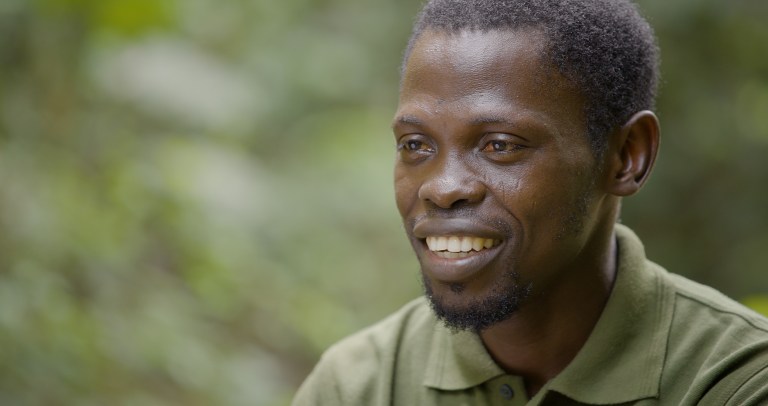
Emmanuel Olabode bravely leads his rangers in through a patrol session as they safeguard the vulnerable Omo Forest Reserve.Photo:Wild Africa Fund
By Onke Ngcuka | 20 Apr 2023
Emmanuel Olabode, a ranger in the tropical forests of Nigeria’s Omo Forest Reserve, has been protecting elephants and other wildlife for almost a decade. His wins include ending elephant poaching in the region amid a dwindling population across the country. He has also been able to reeducate former poachers and hunters towards becoming rangers.
_______________________________________________________________________________________________________________________________
In the southwestern parts of the Nigerian state of Ogun rests the tropical Omo Forest Reserve, home to more than 200 tree types and more than 100 species of birds and mammals. Yet, the reserve is threatened by poaching, illegal timber harvesting and uncontrolled agriculture. But one ranger, Emmanuel Olabode, is trying to change the future of the reserve, which has been plagued by illegal invasion and wildlife population decline.
Olabode became involved with the Reserve about nine years ago through a programme involving the Nigeria Conservation Foundation, Wild Planet Trust, Whitney Wildlife Conservation Trust and the Ogun Ministry of Forestry.
Olabode told Daily Maverick that prior to working with the conservation groups he knew of the elephants but was surprised that they roamed so closely to Lagos State — the Reserve is about 130 km northeast of Lagos. It took Olabode time to track down the elephants, having continuously identified their footprints, dongs and other signs of their presence but not the animals themselves.
https://www.dailymaverick.co.za/wp-cont ... ze=768,406
Elephant populations are declining in Nigeria, due to poaching for ivory among other factors. Elephants in Omo Forest Reserve however have not experienced any poaching since ranger Emmanuel Olabode started working in the reserve. (Photo: Supplied)
The project, called Forest Elephant Initiative, aims to protect and save wildlife in the Reserve while educating nearby communities on the importance of conservation. The forest elephants are being used as a flagship species to canvas the conservation campaign, Olabode said.
“We also have the likes of chimpanzees, most of the primates of the southwestern region are found in that forest (Omo). In achieving that goal, we have various activities which include patrol activities. We have ragers on the ground carrying out surveillance; moving from one part of the forest to another to check what is happening and see if there is any encroachment,” said Olabode.
Biodiversity protection
The initiative also carries out biodiversity monitoring and has collaborations with researchers and experts to ensure that the ecosystem in the forest is intact. About 7% of the forest’s tree cover has been lost over the years due to deforestation.
“Biodiversity is also a good component of our work. Apart from the elephants, there are other animals that are declining in population, some becoming rare to spot in the forest … the Nigeria-Cameroon chimpanzee is on the verge of extinction within Omo Forest Reserve. We also have endemic species such white-throated guenons (a monkey) which are also becoming very rare.”
He added that different types of duiker (yellow and black) have rarely been spotted during patrols, with the same being true for some types of pangolin; one of the most trafficked mammals. Olabode has attributed the loss of animal species to the expansion of human settlements into the forest, as well as deforestation by farmers in the area that are making room for agricultural activities such as cocoa and banana farming.
“Part of the mandate for establishing Omo is for timber harvesting — which is also ongoing. That is not a problem as such because there is a section in Omo where concessions are given for timber harvesting. But where you have a commercial outfit next to a conservation set up, there is bound to be trespassers — people wanting to take advantage,” said the project manager.
A team of about 12 rangers has been key to ensuring the protection of the Omo Forest Reserve, limiting timber harvesting and protecting the wildlife and biodiversity as much as possible. Olabode has been able to expand the team to aid his efforts, by working with the nearby community and rehabilitating former poachers into rangers that now save wildlife and integrate indigenous knowledge into protecting the reserve.
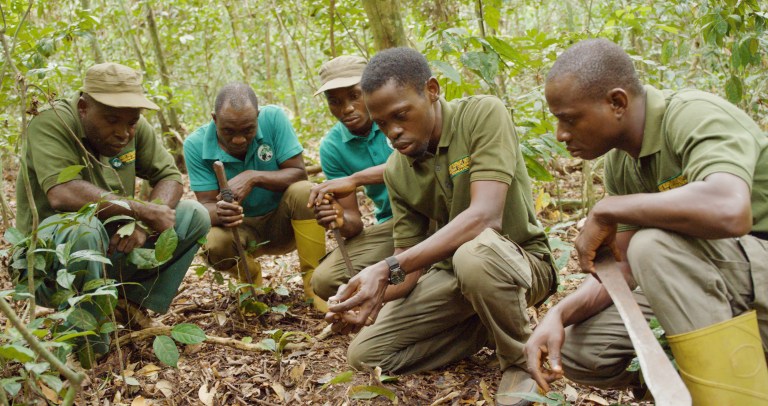
Since starting the programme, Emmanuel Olabode has recruited former poachers and hunters, as well as residents of communities boardering the forest to become rangers and further aid the work he does in the forest. (Photo: Supplied)
Elephant safeguard
There have been zero elephant poaching incidents in Omo since Olabode joined the initiative almost a decade ago. However, an elephant was shot dead in what is suspected to be retaliation, in the Itasin region of Ogun State, due to the elephant disrupting the agricultural activity in the area and poor government intervention.
Though he has had success in achieving the goal of the initiative, the nearby community continues to experience human-elephant conflict. The project manager believes there is much work to do in the Reserve as continuous forest clearance that destroys habitats and steers wildlife towards human settlements remains a challenge.
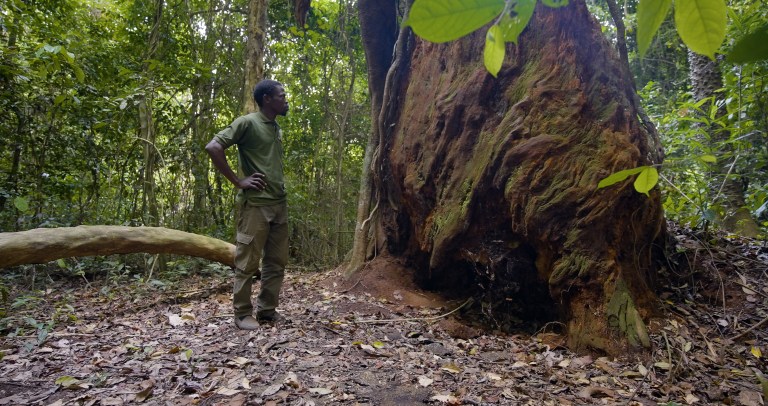
Deforestation is one of the leading causes of declining tree cover in the Omo Forest Reserve. Alongside protecting the wildlife, Olabode and his rangers try and ensure that the community bordering the forest doesn’t encroach into elephant and wildlife habitats by chopping down trees. (Photo: Supplied)
Olabode continued, “The farmers are going into the habitat of the elephants, reducing the space of the elephants to roam around and thereby increasing the chances of human-elephant conflict. In 2018, we witnessed farmers moving into the conservation concession, forcing the elephants out of the area and moving them into nearby communities — to the north of Omo…it came to a point where someone approached a baby elephant and the mother elephant came and trampled that person who died.”
Education drive
The initiative is also still working with the government to educate the public on alternative land acquisition for farming, and how the forest is being used for wildlife and biodiversity. They have also asked that the government declare Omo Forest Reserve a wildlife sanctuary for the elephants and other wildlife in the area.
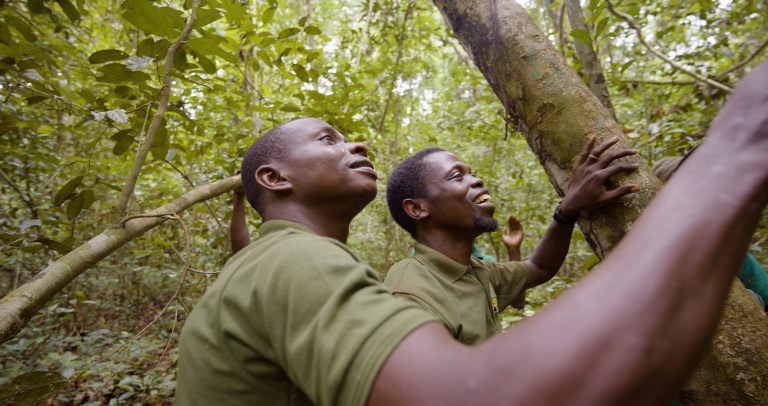
Deforestation is one of the leading causes of declining tree cover in the Omo Forest Reserve. Alongside protecting the wildlife, Olabode and his rangers try and ensure that the community bordering the forest doesn’t encroach into elephant and wildlife habitats. (Photo: Supplied)
Though efforts with the government have progressed, some responses have been slow. But Olabode is not waiting on anyone to ensure the maximum protection of Omo’s wildlife and biodiversity. The initiative runs environmental education programmes at about seven primary schools, as well as running conservation clubs for the youth in Omo to ensure that young people grow up environmentally conscious and hopefully continue the work at the Reserve.
“I understand the fact that the forests also need people as much as the people need the forest to survive,” said Olabode. “We should care about conservation. Particularly, we should be concerned about protection of forest elephants in the sense that it is part of our heritage. It is part of our Cultural identity. And once we lose it, that is gone forever.” DM/OBP
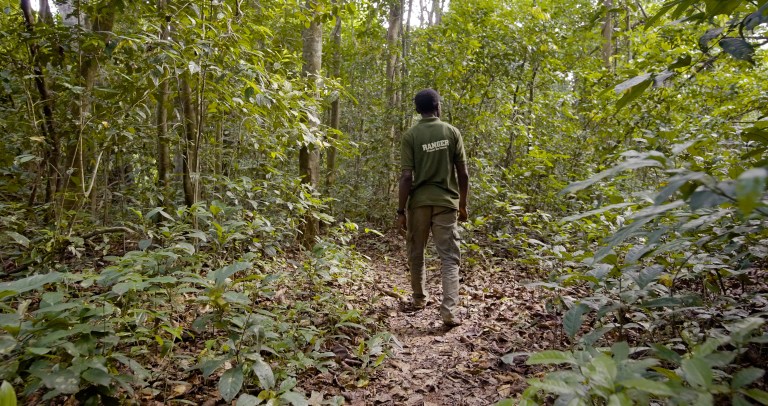
Emanuel Olabode walks through the Omo Reserve Forest where he has worked for nine years, safeguarding the wildlife and biodiversity. (Photo: Supplied)


